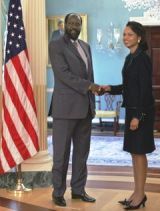US extends sanctions on Sudan, presses for peace results
Nov 2, 2005 (WASHINGTON) — The United States extended sanctions against Sudan as a sponsor of terrorism, and is sending a top diplomat there to assess the results of a US-brokered peace accord that ended 21 years of civil war.
 The moves came as Sudan’s First Vice President Salva Kiir was in Washington on his first official US visit since succeeding former southern rebel leader John Garang, who died in a July 30 airplane crash.
The moves came as Sudan’s First Vice President Salva Kiir was in Washington on his first official US visit since succeeding former southern rebel leader John Garang, who died in a July 30 airplane crash.
Kiir, who is also president of the government of southern Sudan, met with Vice President Dick Cheney, Secretary of State Condoleezza Rice and the US deputy secretary of state, Robert Zoellick.
Sudanese officials had said he was expected to lobby Washington to lift the sanctions, which include an economic embargo.
But the White House said the sanctions would continue another year because Sudan’s actions and policies “continue to pose an unusual and extraordinary threat to the national security and foreign policy of the United States.”
Had Bush not renewed the sanctions first imposed on November 3, 1997, they would have expired Thursday.
Zoellick, speaking at a joint news conference with Kiir after their meeting, said that he would visit Sudan next week to assess the implementation of the peace accord signed on January 9 by the Sudanese government and Kiir’s former southern rebel group, the Sudan People’s Liberation Movement (SPLM).
Zoellick, who has visited Sudan three times this year, said he would travel to Khartoum, Darfur and Juba in the south to evaluate the situation after the pact that ended the civil war that left some two million people dead.
“There are a number of items that we want to see progressing and that’s one reason why I am going to Sudan, it is to try to make sure that the policies that are represented under the CPA (Comprehensive Peace Agreement) are on track and all the parties are participating,” the diplomat said in a joint news conference with Kiir.
The US administration has been at the forefront of international efforts to have the parties to the north-south peace deal implement the accords, which many said can be used as a model to resolve the conflict in Darfur.
The accord, however, did not cover the now 32-month-old conflict in Darfur, which has claimed between 180,000 and 300,000 lives and displaced some 2.6 million people.
The Darfur conflict pits government forces and their Arab militia allies against ethnic minority rebels battling for greater economic and political autonomy from Khartoum.
Zoellick said he had taken advantage of his discussions with Kiir to telephone Sudan’s other vice president, Ali Osman Taha, who represents the government of the north, to reassure himself about Taha’s commitment to the CPA.
The diplomat said he had discussed with Taha the situation in the Darfur region, and told him the continued violence there had “started to raise doubt about their commitment to the CPA”.
“I urged Vice President Taha that if they remain committed to the CPA as they say they are, they had to take actions to back those words,” he said.
Separately, the Sudanese embassy in Washington said that in accord with the CPA, the government would soon announce the formation of additional commissions, including on human rights, and “was withdrawing 17 percent of its troops from Juba.”
Kiir said rebels had agreed to send a common delegation to the next meeting of inter-Sudanese talks on Darfur, organized in Abuja, Nigeria in late November under the auspices of the African Union.
(AFP/ST)
